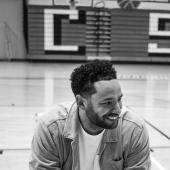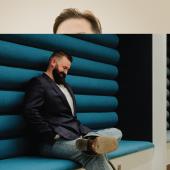Law & Grace
When I first met with Tim Bussey, I wasn’t sure what to expect. I’d never met a trial attorney before. His firm handles criminal cases and personal injury cases. My imagination was full of various TV characters, from Matlock to Saul Goodman, and the attendant stereotypes. Our culture is not kind to lawyers, nor does it expect kindness from them.

His firm is located downtown in a charming old building near Boulder and Tejon. The interior of his office is warm, inviting, and reassuringly solid-looking, with lots of dark wood trim and natural light. Photos of his family and numerous degrees and awards grace the walls. We shake hands, and he offers me a seat.
He smiles and jokes that he’s a little nervous. “I don’t like talking about myself,” he says.
Tim Bussey has handled cases impacting both Colorado law and the law throughout the United States. Though his office is small, the firm has litigated cases that have affected the law on a national scale.
As we settle into the conversation, he begins describing his process of greeting a new client. “When people first come in here, they’re scared,” he says. “They’re stressed. They’re having a bad day.”
This was perhaps never more true than in the recent case of People v. Rau (2020). Patrick Rau’s case reads like an episode of a crime drama. Rau and his girlfriend lived in an old Victorian house downtown. The house had been divided into apartments, one of which the couple occupied. One January morning, the couple realized that an unhoused individual had broken into the basement of the Victorian.
Break-ins had happened before, and since police officers had previously failed (or had been slow) to respond to his calls, Rau decided to investigate the situation himself. He took a headlamp and a loaded revolver and descended into the basement.
When he got to the basement, he saw that the padlock had been pried open. He switched on his headlamp and entered. He found a tall man sleeping in a storage closet. There was drug paraphernalia nearby. Rau nudged the man awake and told him he needed to leave. The man rose and became aggressive, yelling and throwing things. Rau believed the man was under the influence of drugs.
As the situation escalated, Rau became frightened and warned the man he had a gun. He told the man he would count to five, and if the man hadn’t left by that time, he would shoot. The man refused to leave and continued to menace and physically intimidate Rau. Afraid that the man was about to charge him, Rau fired his gun. The intruder died from the gunshot wound, and Rau was charged with second-degree murder.
The case centered around a law named after a scene in Sudden Impact. Clint Eastwood’s character, the detective ‘Dirty Harry,’ points his gun at a robber and says, “Go ahead… make my day!” daring the robber to give him an excuse to shoot. When a person uses deadly physical force against an intruder, the “Make My Day” law provides immunity from prosecution.
“I don’t like the name for this,” Tim says. “Because no one’s day is made by killing someone. Nor was Mr. Rau’s.”
Tim argued that the force-against-intruders or so-called ‘Make My Day’ law would apply and sought immunity for Rau. Previous case law (People v. Cushinberry) states that the force-against-intruders statute applies only to a person’s dwelling and not to common areas. Since the incident occurred in a basement used by the various tenants in common, the prosecution asserted that the force-against-intruders law did not apply in Rau’s case because the basement was not part of his own home. As Mr. Rau’s attorney, Tim Bussey’s job was to find some way to determine that this was indeed a force-against-intruders case, which meant proving somehow that the basement of the Victorian was indeed part of the dwelling.
Tim and his investigator went to the house to examine the scene and talk to witnesses. Tim noticed that the heating controls for the entire building were located in the basement. This information was sufficient to prove that it was part of the dwelling since residents would be required to enter the dark basement to adjust the heat.
Tim also pointed out to the court that prosecutors in burglary cases often expand the definition of a dwelling to include any part of the structure used for habitation. If the prosecution can broaden the definition of “dwelling” in those cases, Tim thought, “why can’t I?”
Because of Mr. Bussey’s unconventional thinking and leg work, Rau was exonerated.
The Bussey Law Firm has impacted constitutional law throughout the United States. Tim shared a second case where his work had an even farther-reaching impact. Bullcoming v. New Mexico, a DUI case that went to the Supreme Court, hinged on a blood sample. The analyst who had tested the original sample could not attend the court proceeding, so the prosecution called a different analyst to the stand–one who didn’t have anything to do with testing the original sample.
The defense rejected this witness, arguing that you would need to confront and cross-examine the person who did the blood test to prove beyond a reasonable doubt. The question was whether the court required that original analyst or whether it was sufficient to cross-examine someone who could read and understand the report’s details.
While working on discovering discrepancies in Colorado’s lab for testing DUI blood samples, Tim attended classes in a lab on how to do these tests. He became designated an American Chemical Society Lawyer-Scientist and learned everything there was to know about the testing process. Bringing this knowledge to bear, he successfully proved over 200 flawed readings over a two-year span, prompting the dismissal of many criminal prosecutions.
Ruth Bader Ginsberg referred to Tim’s work on this litigation, which proved crucial to the verdict in the Bullcoming v. New Mexico case. “Forensic blood testing is not as easy as just popping it in a machine,” Tim explained. “It has to be done in the correct way. You want accurate results, and you have to follow a testing method every single time.”
They pulled Tim’s info and put it in the brief. “This was huge because it changed the way these cases were tried,” Tim said.
“Here in Colorado, or nationwide?” I asked.
“Nationwide. That’s why it impacted constitutional law on a nationwide level. So, you have little Colorado Springs litigation impacting the whole country.”
“And you were right at the middle of that.”
“Well, yeah,” he says, “Because this [litigation] was a pivot point in the case. There is a recipe that needs to be followed every time to get the perfect sourdough bread. And you know that if you don’t bake that break in exactly the same way each time, you’re going to run into a problem. Now, elevate that to scientifically testing for a particular drug such as alcohol or marijuana. If you don’t follow the exact procedure, the recipe, you’re not going to get a good result.”
“And someone’s life is going to be affected by that.”
“Absolutely. And this case affected criminal cases throughout the land.”
Mark Rue, a colleague of Tim’s here in Colorado Springs, echoed the importance of Tim’s work to ensure the accuracy of DUI blood testing here in the Springs.
“Tim spent hours and hours of legal research, investigation, and hearings to have the El Paso County courts determine the lab that performed the blood test was not performing its blood tests in compliance with proper rules. Tim’s hard work not only helped his client but numerous other people charged with a DUI.”
Even recently, Tim spearheaded a challenge to DUI cases during Covid. Law enforcement stopped offering breath tests because they determined that breath tests were unsafe during Covid. Tim immediately obtained records from the Colorado Department of Health and Environment (CDPHE), which stated the protocol for DUI breath testing during Covid. Further, he subpoenaed the head of the CDPHE evidential breath testing program to testify concerning the safety of breath testing during Covid.
The litigation then went to County Court, where ultimately, the courts determined that Colorado’s Express Consent law had been violated. This successful challenge led to the dismissal of many cases because of the litigation of this violation of the law.
Tim Bussey has also turned his attention to high-profile personal injury cases. His representation has led to the recovery of millions of dollars for those injured in personal injury cases. Because of his years of experience litigating cases, he has been requested on wrongful death cases, including motor vehicle accidents, biking accidents, pool drownings, and other wrongful cases.
Interviewing Tim was a challenge. He kept turning the spotlight off of himself. He seemed much more comfortable asking questions than answering them. He told me a lot about the fascinating details of his cases and how the arguments played out but very little about himself. I got the best insight from other lawyers who have interacted with him over time.
“When Tim interacts with a client,” Denver Attorney Sarah Schielke told me, “you can easily tell that they have the complete undivided attention of both his heart and his mind. Our clients come to us in crisis; Tim immediately makes his clients feel heard, understood, and protected.”
Greg Willis, an Atlanta-area attorney and colleague of Tim’s said something that especially resonated. “Each time I talk to Tim, I learn new things that make me a better lawyer. If someone wants the absolute best chance to win their case, I would recommend Tim Bussey. He is not only a genius, but he also knows how to relate to people to win them over.”
Sitting in Tim’s office, I could easily imagine myself as a distressed client. Being accused is disorienting. In that situation, it might feel like there’s nobody who understands.
In that situation, it would be nice to meet a lawyer like Tim Bussey.





